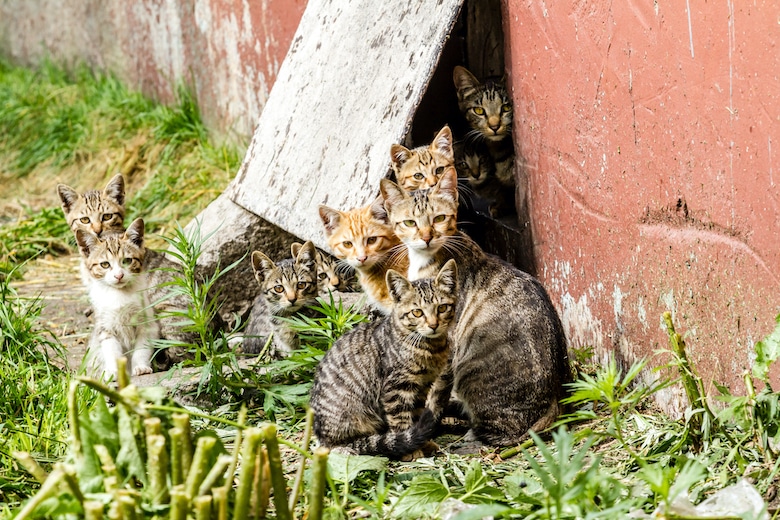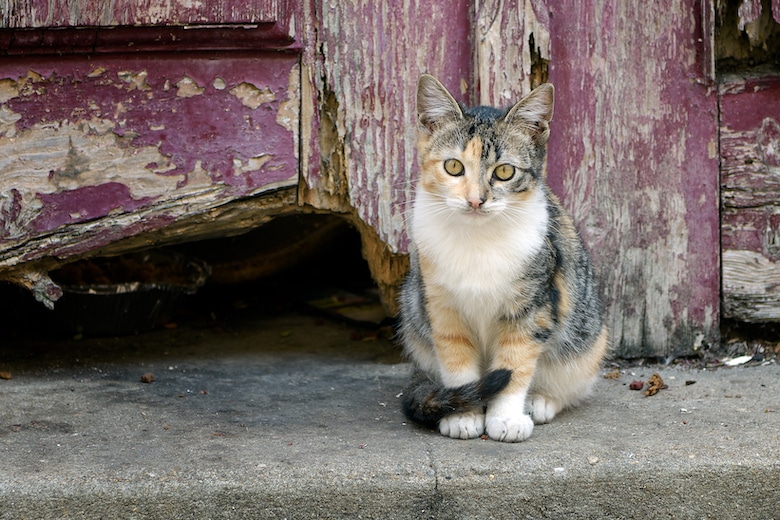The post Should You Care for Your Neighborhood Feral Cat Colony? by Beth Ann Mayer appeared first on Catster. Copying over entire articles infringes on copyright laws. You may not be aware of it, but all of these articles were assigned, contracted and paid for, so they aren't considered public domain. However, we appreciate that you like the article and would love it if you continued sharing just the first paragraph of an article, then linking out to the rest of the piece on Catster.com.
If you have feral cats in your community, it’s only natural to wonder whether they are too cold, too hot or hungry. And it’s tempting to try to help them.
“Anybody who goes into wanting to take care of a feral cat community is definitely a compassionate individual who really is going into it to try to help animals,” says Destiny Haney, the national embed program manager at Best Friends Animal Society.
But Destiny warns that caring for a feral cat colony is not for the faint of heart. Feral cats need care and consistency to survive. No matter how well-intentioned your desire to help is, you may do more harm than good if you cannot provide both.
“Depending on the type of resources you want to provide for a colony, it can be a financial expenditure or a big time investment or it could be both,” says Destiny. “People need to think long and hard before they step into care of a colony.”
She suggests considering these four things before taking on a feral cat colony.

Photo: VittoriaChe/Getty Images
Are you sure your neighborhood feral cats need help?
You may think that no one is caring for a community of feral cats, but that may not be the case.
“We find that most established colonies, as long as they look like they are in good condition, usually have someone taking care of them … and they may not need you to take care of them,” says Destiny. “It doesn’t mean you can’t still help them, but they may not be in as dire need as some people may assume.”
If you still want to help them, even if they may have another person or group of people providing food, ask yourself why. This is something you can go back to and remind yourself of on a stressful day.
Can you provide long-term care consistently?
When you rescue a house cat, you promise to take care of them for the rest of their lives. The same is true for feral cat colonies. Though we don’t have precise data on the average life span of ferals, these kitties will rely on you for food for their entire lives. And feeding feral cats may be different than what you do for your little sofa lion.
If you have a house cat, you might allow them to free-feed throughout the day. But Destiny suggests scheduling feedings for colonies. It’s a commitment that requires being around at the same time every day.
“You are the sole caregiver of the cats and if something were to happen to you, [such as] you change your job or move, what happens to those cats and who is going to provide care to them? Or even if you are on vacation, who is going to care for those cats?” Destiny says.
Think through whether you have someone who can help if you go on vacation or who can step in for you if you move. Unlike a house cat, you can’t take ferals with you if you leave town for good.

Photo: Ed-Ni-Photo/Getty Images
Can you trap-neuter-return and provide medical costs?
If you do one thing for a feral cat colony, help trap-neuter-return (or TNR).
“That’s the best thing you can do for an outdoor cat if you want to help them, whether you can commit to full-time caregiving or not, but especially if you are going to be feeding them … because the more you feed them, the more they breed,” says Destiny.
Costs vary. Some clinics may provide TNR services at low or no cost. Rescue groups and shelters may also help to offset costs. Best Friends Animal Society provides assistance in some areas.
If paying out of pocket, it can cost around $70-$80 per cat.
Also, unlike indoor cats, ferals aren’t living in a protective bubble. They’re more at-risk for illnesses and injuries.
“It’s not typically covered by anyone,” Destiny warns. “If you are not able to provide those, then are you able to work with rescue groups and neighbors to provide for the care?”
Can you be a good neighbor?
People in the community may not be as big-hearted as you are when it comes to ferals. The food can attract other animals and flies, and they may put other animals like small dogs or indoor/outdoor cats at risk.
Destiny advises against trying to start a colony, regardless of where you live. But if you’re going to care for an established one, minimize the complaints and potential calls to animal control by taking some common-sense measures.
“It’s really important for the caregiver to be respectful of that and try to make the cats be good neighbors and the person be a good neighbor by cleaning up messes, not leaving trash around,” Destiny says.
TNR also plays into being a good neighbor.
“I think people tend to get concerned when they see kittens,” Destiny says. “No one wants to see kittens in dumpsters.”
Featured Image: ablokhin/Getty Images
Read Next: How to Help Your Barn Cat Through the Winter
The post Should You Care for Your Neighborhood Feral Cat Colony? by Beth Ann Mayer appeared first on Catster. Copying over entire articles infringes on copyright laws. You may not be aware of it, but all of these articles were assigned, contracted and paid for, so they aren't considered public domain. However, we appreciate that you like the article and would love it if you continued sharing just the first paragraph of an article, then linking out to the rest of the piece on Catster.com.
Beth Ann Mayer